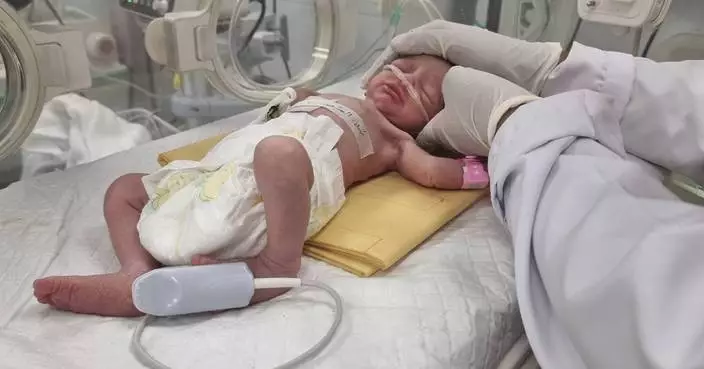Brianna nearly died twice after giving birth to her daughter – and the ordeal then solved the mystery of how her sister had died at just 27.
A mum-of-two – who faced death twice after giving birth – has spoken poignantly of her guilt over surviving the same rare heart disease that killed her older sister.
Already a mum to Rafael, now six, Brianna Henderson, 25, was delighted to discover she was expecting again in early 2016 – but she had no idea how complicated the birth would become, with doctors, at one point, giving her a 50/50 chance of survival.
After delivering a healthy baby girl, Talaycia, in November 2016, she started haemorrhaging uncontrollably, and two months after that, she went into heart failure and was diagnosed with peripartum cardiomyopathy (PPCM).
The condition, which sees the heart enlarge and weaken, therefore less able to pump blood than normal, can be fatal – and Brianna’s diagnosis led to medics finally solving the mystery of what had killed her sister Crystal Prieston at just 27 in May 2014.
Brianna, a mail handler, of Grand Prairie, Texas, explained: “The doctors had said she could have developed PPCM, but never officially diagnosed her. They thought that she had simply passed away from cardiac arrest.
“When I was in heart failure, though, my cardiologist realised that it was the same thing my sister had been through, so he put it all together and confirmed that she had PPCM too.”
She continued: “Doctors gave me medicine, which thankfully had an effect, but that made me feel guilty. Why did it work for me and not for Crystal? I didn’t really know whether to take it as a good thing or a bad thing.”
Expressing her frustration at the lack of research on PPCM, she continued: “Why doesn’t anyone know about it? It’s killing women and my sister died from it. She has babies who can only learn about their mum through pictures.”
Brianna, who is married to Tech Henderson, 31, who works at a distribution centre, told of how her sister Crystal developed a nasty cough and struggled with breathlessness three months after the birth of her second child in October 2013.
Tragically, Crystal fell into a coma after her heart suddenly stopped in May 2014 and within days, doctors broke the news that there was nothing more they could do, and the family made the heart-wrenching decision to withdraw her life support.
“Her husband decided to end life support after three days. It was heartbreaking being there. I promised her I wouldn’t leave her side, I stayed until the very end,” recalled Brianna.
In the wake of Crystal’s death, the family were told that she had died from cardiac arrest.
And, when Brianna fell pregnant again three years later, all too aware of what had happened to her sister, she attempted to take precautions.
“It crossed my mind that Crystal had passed away after her second child, so I asked doctors to check out my heart when I was 36 weeks pregnant,” she explained.
“They found a heart murmur, which is an unexpected or unusual sound heard through a stethoscope.”
Brianna in hospital (Collect/PA Real Life)
She added: “They said most of the time, heart murmurs are harmless, and mine would go away on its own, so I didn’t worry.”
From there, most of Brianna’s pregnancy went smoothly, except for long-term morning sickness – which, after sharing her story with fellow survivors, she now believes was an early symptom of PPCM.
In contrast, the birth, in November 2016, was very traumatic.
She explained: “The birth was horrible. I haemorrhaged two litres of blood and was rushed into surgery, where I needed four blood transfusions.
“My placenta hadn’t detached itself, which was causing the bleeding, and they tried to remove it but I had to be rushed into surgery.
“It was terrifying, I thought I was going to die and I just started praying.”
Brianna at her sickest in comparison to today (Collect/PA Real Life)
Brianna continued: “A doctor had to take the rest of it out in surgery, and almost had to take my uterus out too to stop the bleeding, but didn’t have to in the end.
“I spent five hours in surgery and when I woke up, I was very swollen and confused.”
Brianna and her daughter then remained in hospital for seven days while she recovered.
Once home, though, she then started to develop what she initially thought was a common cold.
Busy with her hectic life as a new mum, she ignored her symptoms until Boxing Day 2016, when she spent the night struggling to breathe, and raced to hospital.
She said: “I started coughing up pink phlegm and couldn’t breathe properly.”
She added: “When I got to the emergency room, my blood pressure was super high, in the 150s, when it should be between 90 and 120.
“They did a CT scan and saw my heart was enlarged. My doctor, who had seen my sister die from cardiac arrest, said it sounded like I had the same thing. But at that stage, they still weren’t sure what exactly that was.”
After dozens of tests, a cardiologist finally told Brianna that she was suffering from PPCM.
Occurring in roughly one in every 5,000 to one in every 10,000 women, it usually presents itself in those over 30, either in the last month of pregnancy or up to six months postpartum, according to the charity Cardiomyopathy UK.
Affecting the left ventricle – the main pumping chamber – it causes the muscular wall to become stretched and thin.
With an X-ray where they saw fluid on her lungs, a CT which showed that her heart was enlarged, and an ECG showing reduced heart function, doctors were able to diagnose Brianna, and link her condition to her sister’s death.
Recalling how she felt after the bombshell news, she said: “I was so stressed out. I’d just had a baby, and then they were telling me I had heart failure.
“It was devastating, but I wasn’t supposed to be stressed because it would hurt my heart more.
“My heart could have stopped at any moment and the doctor was surprised it didn’t. He gave me a 50/50 chance of survival.”
While a normal person’s heart should function at 55 to 70 per cent ventricular ejection fraction – which refers to what percentage of blood leaves your heart each time it contracts – Brianna’s was functioning at just 15 per cent.
But, with her husband Tech by her side, she clawed her way back to health after seven days in intensive care, where she was pumped full of Lisinopril, an enzyme inhibitor used to treat heart failure.
Once discharged, she was given a LifeVest – a wearable defibrillator – which she had to keep on 24/7 for seven months.
She continued: “I had to wear it for seven months. The only time I took it off was whilst showering.
“It was so uncomfortable and itchy, but it’s what I had to do to make sure my heart came back if it stopped.”
Luckily, Brianna never had to be shocked by the LifeVest, and in July 2017, her cardiologist fitted her with an implantable cardioverter-defibrillator (ICD), which operates in the same way as the vest.
Her heart is now showing signs of improvement, and she continues to be regularly monitored.
Discussing whether she would consider having more children after the harrowing experience, she said: “It’s scary. You don’t know if it’s going to happen again, and if you’d be here to raise the other kids you already have.
“I do think about having more, but my husband doesn’t want to go through that again. It was a very scary situation.”
Though still wrestling with survivor’s guilt, Brianna is determined to use her experiences to educate more women about the condition, so that they do not have to experience the same loss she has endured.
She has now started a blog – called Let’s Talk PPCM – where people are invited to share their own stories about PPCM to raise awareness.
Brianna said: “I don’t want to scare women, I want to prepare them.”
She continued: “Even if you’ve just got a little cough or cold right after birth, or swelling of your hands and feet, breathlessness or a racing heartbeat, that is something you need to get checked.
“We just think our symptoms are normal because we’ve just had a baby and every pregnancy is different, so it’s easy to miss. I know that for a fact because my sister is no longer with us.”
To check out Brianna’s blog visit www.facebook.com/pg/LetsTalkPPCM






